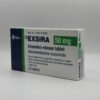
Depreta 60 (60mg capsule x 30)
$53.23
Depreta 60 is a medication available in the form of 60mg capsules. It is prescribed for various medical conditions, often related to mood disorders, such as depression or anxiety. This medication works by regulating certain chemicals in the brain to improve emotional well-being and mental stability. Always follow your healthcare provider’s instructions when taking Depreta 60.
Depreta 60 is a medication that contains the active ingredient Duloxetine Hydrochloride, and it is commonly used to treat a variety of conditions, with the most common being major depressive disorder (MDD), generalized anxiety disorder (GAD), and certain types of chronic pain conditions, such as diabetic peripheral neuropathy, fibromyalgia, and chronic musculoskeletal pain. Below is a detailed description along with dosage and usage information:
Active Ingredient: Duloxetine Hydrochloride
Description:
- Drug Class: Depreta 60 belongs to a class of drugs known as selective serotonin and norepinephrine reuptake inhibitors (SNRIs). It works by increasing the levels of two neurotransmitters, serotonin and norepinephrine, in the brain. These neurotransmitters play a key role in regulating mood and pain sensation.
Dosage:
- Depreta 60 is available in 60 mg capsules. The dosage may vary depending on the condition being treated and individual patient response. It’s crucial to follow your healthcare provider’s instructions regarding the specific dosage and duration of treatment.
- Typically, the starting dose for depression and anxiety disorders is 60 mg once daily, either in the morning or evening. Your doctor may adjust the dose based on your response to the medication.
- For pain conditions, the dosing regimen may also start at 60 mg once daily and be adjusted as needed.
Usage Information:
- Administration: Swallow the Depreta 60 capsule whole with a full glass of water. Do not crush, chew, or open the capsule, as this may affect the medication’s controlled-release mechanism.
- Timing: You can take Depreta with or without food, but it’s important to take it at the same time each day to maintain a consistent level of the drug in your system.
- Duration of Treatment: Continue taking Depreta 60 for the duration prescribed by your healthcare provider, even if you start to feel better. Stopping the medication abruptly can lead to withdrawal symptoms, so it’s important to taper off under your doctor’s supervision when discontinuing treatment.
- Regular Monitoring: Your doctor may want to monitor your progress during treatment, especially in the initial weeks, to ensure that the medication is working effectively and to assess any potential side effects.
Precautions:
- Inform your healthcare provider about any medical conditions you have, especially if you have a history of liver or kidney problems, seizures, bleeding disorders, or glaucoma.
- Tell your doctor about all medications, supplements, and herbal products you are currently taking to avoid potential drug interactions.
- Depreta 60 may cause dizziness or drowsiness, so avoid activities that require mental alertness, such as driving or operating heavy machinery, until you know how the medication affects you.
- If you experience any unusual or severe side effects, such as allergic reactions, severe nausea, vomiting, or worsening of depression, contact your doctor immediately.
It’s essential to use Depreta 60 as directed by your healthcare provider to maximize its benefits and minimize the risk of side effects. If you have any questions or concerns about your medication, consult your healthcare provider or pharmacist for guidance.
| Weight | 0.06 kg |
|---|---|
| Dimensions | 3 × 3 × 1 cm |
Related products




